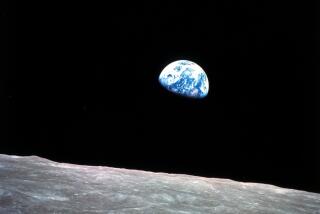From ‘Star Trek’ to the Stars
- Share via
Themes of hope and devotion replayed many times across the life of astronaut Michael P. Anderson.
In youth, he was energized by the challenges of science and the possibilities of flight. In what turned out to be his final days, he sought to inspire those around him. The doting father and committed Christian was one of just seven African American astronauts in the space program.
“He took very seriously the position he had,” said Garrett Booth, executive pastor at the church Anderson and his family attended in the Houston suburb of Clear Lake along with Columbia commander Rick D. Husband and his family.
At 43, Anderson had a master’s degree in physics, medals for his service as an Air Force pilot and more than 200 hours of spaceflight behind him. He tried to leverage his accomplishments, Booth said, “to influence and encourage not just African American children but all children to reach for their dreams.”
As recently as Thursday, in an interview from the shuttle on National Public Radio, Anderson was affirming the prospects for African Americans in the space program.
He said that three more black astronauts were expected to be joining missions. “It looks like the future is really bright,” he told Tavis Smiley, host of an NPR talk show.
He described the importance of some of the mission’s experiments to black Americans, including a prostate cancer project.
Mathew Michnovicz, who lives next door to the Anderson home in Houston, said his neighbor spoke often and fondly of the space program. “I have a 5-year-old son, and he liked to talk to [him] about being an astronaut,” Michnovicz said. Friends said Anderson frequently took his two daughters, ages 8 and 10, for bicycle rides in the neighborhood, where many NASA workers live.
His wife, Sandra, has a flair for gardening and often shares tips with neighbors. Anderson had looked forward to his mission on Columbia for years. As the date approached, he made sure several neighbors and church members received VIP passes to view the Jan. 16 launch in Florida. At Grace Community Church, members gathered for a send-off ceremony early last month. Anderson and Husband spoke of their excitement about getting back in space and the experiments they would be conducting.
Anderson’s journey to space began in childhood, when he imagined following in the footsteps of his father, whose career was the Air Force. Anderson was born on Christmas Day 1959 in Plattsburgh, N.Y., and his family moved to Spokane, Wash., where his father was stationed, when he was 11. Later, at Cheney High School, he became a fan of the “Star Trek” and “Lost in Space” television series.
While others goofed off, he was “part of a group of kids that just seemed fired up about the academic side of high school,” he recalled in 1998.
His mother, Barbara, said he would often seclude himself, doing chemistry experiments or studying electronics. He went on to earn a bachelor’s degree in physics and astronomy from the University of Washington and a master’s degree in physics from Creighton University in Omaha. He later recalled, in speaking engagements in which he encouraged minority students to explore the sciences, that he was one of the only African Americans in his college physics classes.
“The biggest thing that holds a lot of people back is the fear of taking that first step, to go out and take the challenge,” he told a group of college students in Chicago.
By the early 1990s, he was an Air Force pilot and was completing his master’s. He was selected for the space program in 1994 and traveled to Russia’s Mir space station on his first mission in 1998.
Anderson’s mother recalled Saturday that he had always dreamed of flying. “And that’s what he did. He was a lovely kid. That’s all I can say.”
More to Read
Sign up for The Wild
We’ll help you find the best places to hike, bike and run, as well as the perfect silent spots for meditation and yoga.
You may occasionally receive promotional content from the Los Angeles Times.






